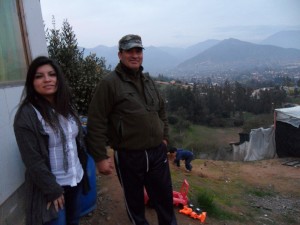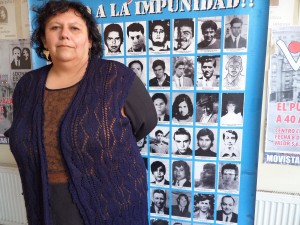Chile’s Dictatorship: Were Soldiers Victims, too?
In a modest hilltop home off of a long, winding road that leads out of Santiago into the Andean mountains, Anastasio Palma and Carlos Ortega recall life in the Armed Forces.
But this isn’t your typical soldier reunion, filled with tales of camaraderie. Palma and Ortega were conscripted during the Augusto Pinochet dictatorship, and are part of a growing movement demanding reparations from the Chilean government for alleged human rights violations.
 “Me and my brothers, we get together and we suffer. We don’t remember good times, but the bad times,” says Palma, who was conscripted in 1978 at the age of 17, and posted near Chile’s border with Argentina and Bolivia.
“Me and my brothers, we get together and we suffer. We don’t remember good times, but the bad times,” says Palma, who was conscripted in 1978 at the age of 17, and posted near Chile’s border with Argentina and Bolivia.
Palma describes a climate of terror within the ranks: being beaten by his superiors in ways that would later become hallmarks of the brutal military dictatorship – though more frequently associated with the treatment of “enemies of the state.”
“You’re naked. They put electrodes onto your body. They take your fingernails out. Then they lay you on your back and put wet cloths on your face and pour water on top of your face,” Palma says.
Dpc guard dog mistake for the most part happens when you refresh your windows to higher form by virtue of driver issues dpc watchdog voilation blue screen This dpc guard dog blunder is trailed by the framework crash or blue screen of death however not a major issue but rather troublesome.
Listen to the CBC Radio Documentary
He and his comrades are campaigning for compensation from the Chilean state for abuse, unpaid pensions, and salaries for mandatory military service.
But in the eyes of Chileans who lost loved ones or personally suffered from the abuse and repression of the Pinochet regime, the claims filed by former soldiers like Palma and Ortega are hard to digest.
Chile’s trajectory was radically altered when Augusto Pinochet seized power in a 1973 coup. In the ensuing 17 years of military rule, an estimated 40,000 people were detained and tortured, and more than 3,000 people were killed or disappeared.
Part of the military machine, like it or not.
Pinochet-era conscripts are in “the uncomfortable category where the brave, noble victim or survivor, and the terrible, appalling, evil perpetrator kind of join up, and suddenly it’s the same person,” says Cath Collins, director of the Human Rights Observatory at the University of Diego Portales in Santiago.
 Lorena Pizarro, president of the Chilean NGO Families of Disappeared Detainees, says former conscripts have been part of a decades-long pact of silence, refusing to release information about victims whose remains have never been found.
Lorena Pizarro, president of the Chilean NGO Families of Disappeared Detainees, says former conscripts have been part of a decades-long pact of silence, refusing to release information about victims whose remains have never been found.
“They were conscripts, we cannot deny that their lives were in danger,” says Ms. Pizarro.
And yet, says Pizarro, “They never cooperated with the judiciary, never provided information. Then they re-appear, declaring themselves as victims, saying they had to obey orders, asking for indemnity, and in some kind of schizophrenia of state terrorism, they transform themselves from victimizers into victims.”
Not the ‘the purview of the military conscript’
Those considered political opponents of the regime – who ranged from radical leftists and their families, to artists, singers, and students – were systematically rounded up under the Pinochet regime.
Under Pinochet, conscripts and low-level troops guarded detainees and delivered them to detention centres where many were then tortured and often killed. Young men aged between 16 and 20 from largely poor and low-income families were systematically drafted for a minimum of one year, while wealthy families with political connections could often avoid the draft.
Former soldiers like Palma say they had no choice but to follow orders, and would otherwise face torture or death themselves. Palma says he and his comrades are victims of the regime too, and deserve compensation, just as victims and their families receive.
Families of the disappeared have reacted to the campaign with incredulity.
“During the 17 years of dictatorship, conscripts, who know the truth of what they did, have never given the names of those who gave them orders, or anything,” says Ms. Pizarro, the victims’ rights advocate.
This is personal for Pizarro, who does not know what happened to her father under Pinochet. Her parents were Communist Party members and under constant surveillance. The family moved several times – and young Pizarro changed schools almost yearly.
One day in the summer of 1976, she and her family woke up to find four freshly dug graves in their front yard. She was 10 years old, and shortly thereafter, her father disappeared.
To hide the evidence of executions, Pinochet’s forces threw bodies into the Pacific Ocean and used dynamite to blow up victims’ corpses, making it all but impossible for families to find and bury their loved ones.
But Leith Passmore, a historian at the University of Chile who is writing a book about Chile’s former conscripts, says if they were complicit in human rights abuses, they played a minor role.
“The crimes against humanity that occurred under the dictatorship were committed overwhelmingly by the intelligence services – the DINA and later the CNI – not by [the] regular army, especially not by conscripts,” Mr. Passmore says.
“The disappearances and extrajudicial executions really weren’t the purview of the military conscript.”
When investigating judges began prosecuting human rights abuses well after Chile’s 1990 transition to democracy, they targeted military officers and their political superiors. The former head of the feared DINA secret police, Manuel Contreras, is serving a combination of prison sentences totalling more than 250 years in connection with murders, abductions, and forced disappearances.
Last month, the lawyer representing Mr. Contreras and other ex-officials offered to enter into a “dialogue” with families about the whereabouts of the disappeared, in exchange for benefits to his clients, such as possible reductions in prison sentences.
Outraged victims’ groups rejected the offer as “blackmail.”
‘It was the law’
Former conscripts are keen to distinguish themselves from the officers who commanded them.
“We didn’t do military service for the pleasure of it. We were there because it was the law,” says Ortega, back at Palma’s hilltop home.
“I was used by Pinochet and his gang of criminals to do the work of repression against my will. And that has to be paid for. There must be justice for that.”
In March, President Sebastián Piñera offered former conscripts $40 million, a sum that conscript representatives dismissed as insufficient for the almost 400,000 men who were drafted between 1973 and 1990.
The half-dozen ex-conscript associations in Chile have since turned their attention to left-leaning parties likely to form a coalition with presidential front-runner Michelle Bachelet after the second round of this month’s election, with the aim of getting a better deal.
Meanwhile, victims continue to hope that more ex-soldiers will chip away at the wall of silence behind which their loved ones remain missing.
“[W]hat have they done in these 40 years, that we might have at least have a modicum of relief?” Pizarro asks. “What have they done to make up for what they did – for what they say they were forced to do, and for which their superiors have gone to jail? What have they done to wash themselves clean of such crimes?”
(This report appeared in The Christian Science Monitor.)

